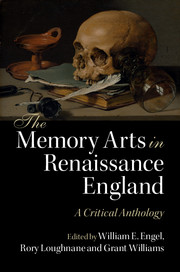Book contents
- Frontmatter
- Dedication
- Contents
- List of figures
- Acknowledgements
- A note on abbreviations
- Introduction
- PART I The art of memory
- Introduction to Part I
- I.1 Stephen Hawes, The Pastime of Pleasure (1509)
- I.2 [Laurence Andrewe], The Mirror of the World (1527)
- I.3 Peter of Ravenna, The Phoenix (1548)
- I.4 Guglielmo Gratarolo, The Castle of Memory (1562)
- I.5 Hugh Plat, The Jewel House of Art and Nature (1594)
- I.6 William Basse, A Help to Memory and Discourse (1620)
- I.7 John Willis, The Art of Memory (1621, 1661)
- I.8 Henry Herdson, Ars memoriae; the Art of Memory Made Plain (1651)
- I.9 Richard Saunders, Art of Memory (1671)
- I.10 Marius D'Assigny, The Art of Memory (1697)
- PART II Rhetoric and poetics
- PART III Education and science
- PART IV History and philosophy
- PART V Religion and devotion
- PART VI Literature
- Index
- References
I.4 - Guglielmo Gratarolo, The Castle of Memory (1562)
from PART I - The art of memory
Published online by Cambridge University Press: 05 August 2016
- Frontmatter
- Dedication
- Contents
- List of figures
- Acknowledgements
- A note on abbreviations
- Introduction
- PART I The art of memory
- Introduction to Part I
- I.1 Stephen Hawes, The Pastime of Pleasure (1509)
- I.2 [Laurence Andrewe], The Mirror of the World (1527)
- I.3 Peter of Ravenna, The Phoenix (1548)
- I.4 Guglielmo Gratarolo, The Castle of Memory (1562)
- I.5 Hugh Plat, The Jewel House of Art and Nature (1594)
- I.6 William Basse, A Help to Memory and Discourse (1620)
- I.7 John Willis, The Art of Memory (1621, 1661)
- I.8 Henry Herdson, Ars memoriae; the Art of Memory Made Plain (1651)
- I.9 Richard Saunders, Art of Memory (1671)
- I.10 Marius D'Assigny, The Art of Memory (1697)
- PART II Rhetoric and poetics
- PART III Education and science
- PART IV History and philosophy
- PART V Religion and devotion
- PART VI Literature
- Index
- References
Summary
About the author and translator
Guglielmo Gratarolo (1516–1568) undertook medical training in Padua and by 1539 he was a member of the College of Physicians in Bergamo. Gratarolo's works about medicine and philosophy were widely read in the period, including treatises discussing alchemy, plague epidemics and health regimens for travellers. After converting to Protestantism later in life, he fled to Basel. William Fulwood (d. 1593), author and translator, was a member of the Merchant Taylors' Company. He is now best known for his works dispensing practical advice, most notably, The Enemy of Idleness (1568), a manual for letter writing.
About the text
Gratarolo's De memoria reparanda, augenda confirmandaque ac de reminiscentia was first printed in Basel in 1553; nine years later, Fulwood's translation, The Castle of Memory, was printed in London. Fulwood dedicated the work to Lord Robert Dudley, a favourite of Elizabeth I, and later 1st Earl of Leicester. The Castle of Memory is prefaced by an eight-page-long doggerel poem by Fulwood, citing the usefulness of a strong memory for various occupations: judges, preachers, captains, merchants, lawyers and husbandmen. In Fulwood's address to the reader, dated 20 November 1562, he claims that two ‘causes’ prompted this translation: for his own ‘exercise and commodity’, and also for the ‘common utility and profit of my native country’. The work consists of seven chapters and an epilogue. We present examples of the work's discussion of the causes of ‘hurt’ memory with ‘signs and cures’ (ch. 2), the principal ‘endamages’ to memory (ch. 3), ‘particular helps’ to memory (ch. 4), various ‘medicinal compounded remedies’ for poor memory (ch. 5), and rules and precepts for memory and remembrance (ch. 6). But we primarily focus on the first chapter, which describes the importance and utility of memory, and the final chapter, which discusses the art of memory.
The arts of memory
In a wide-ranging text, indebted to many sources, Gratarolo's treatise places ancient philosophy (Aristotle, Cicero, Ad Herennium) alongside modern medicine (Andreas Vesalius), a detailed exposition about locative memory alongside folksy health cures. Unlike the corrupt Phoenix, Fulwood produces an eminently readable translation of Gratarolo's work. The middle chapters of the work give a flavour of the eclectic contemporary understanding of memory and treatments for forgetfulness.
- Type
- Chapter
- Information
- The Memory Arts in Renaissance EnglandA Critical Anthology, pp. 51 - 64Publisher: Cambridge University PressPrint publication year: 2016



